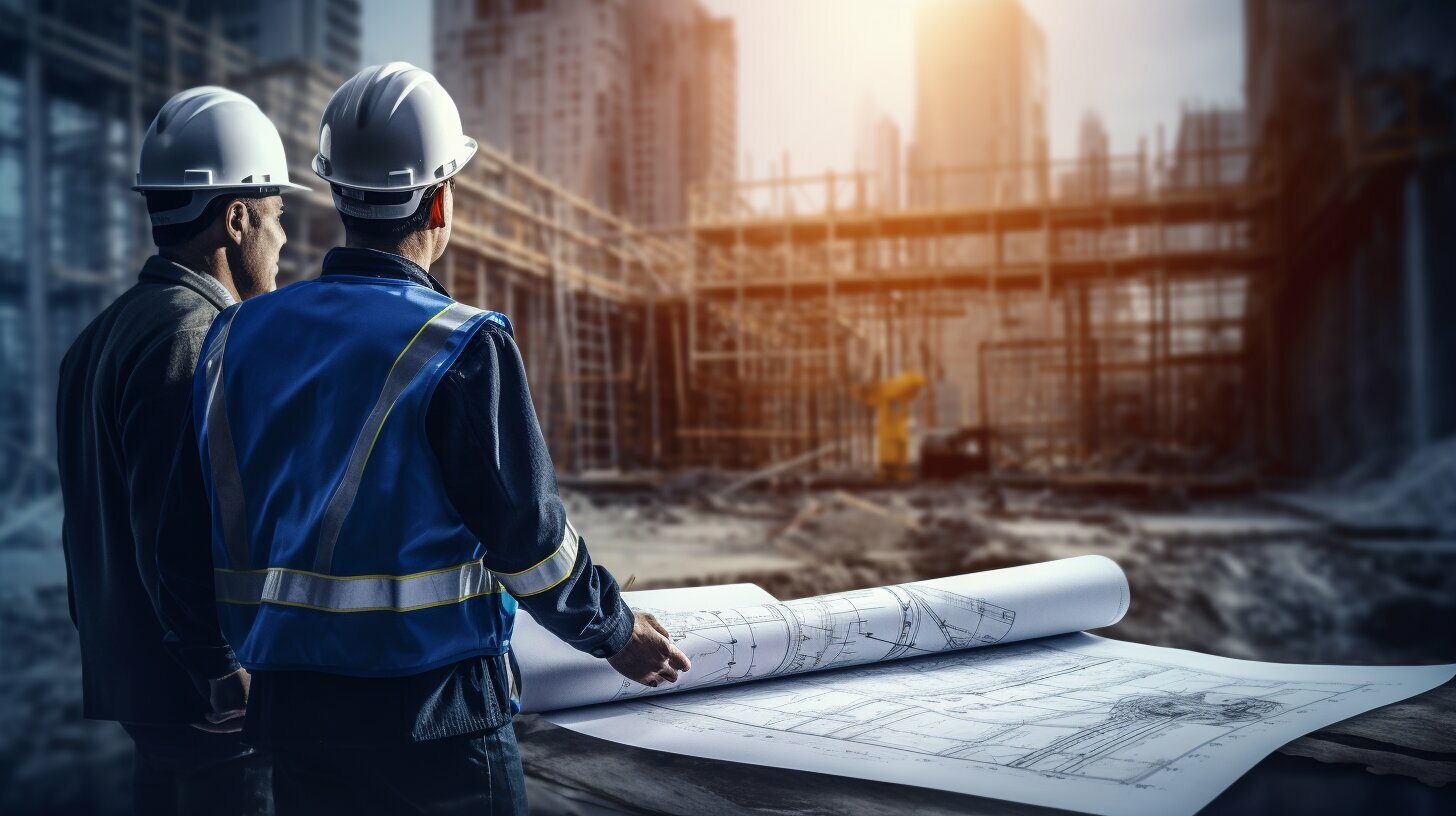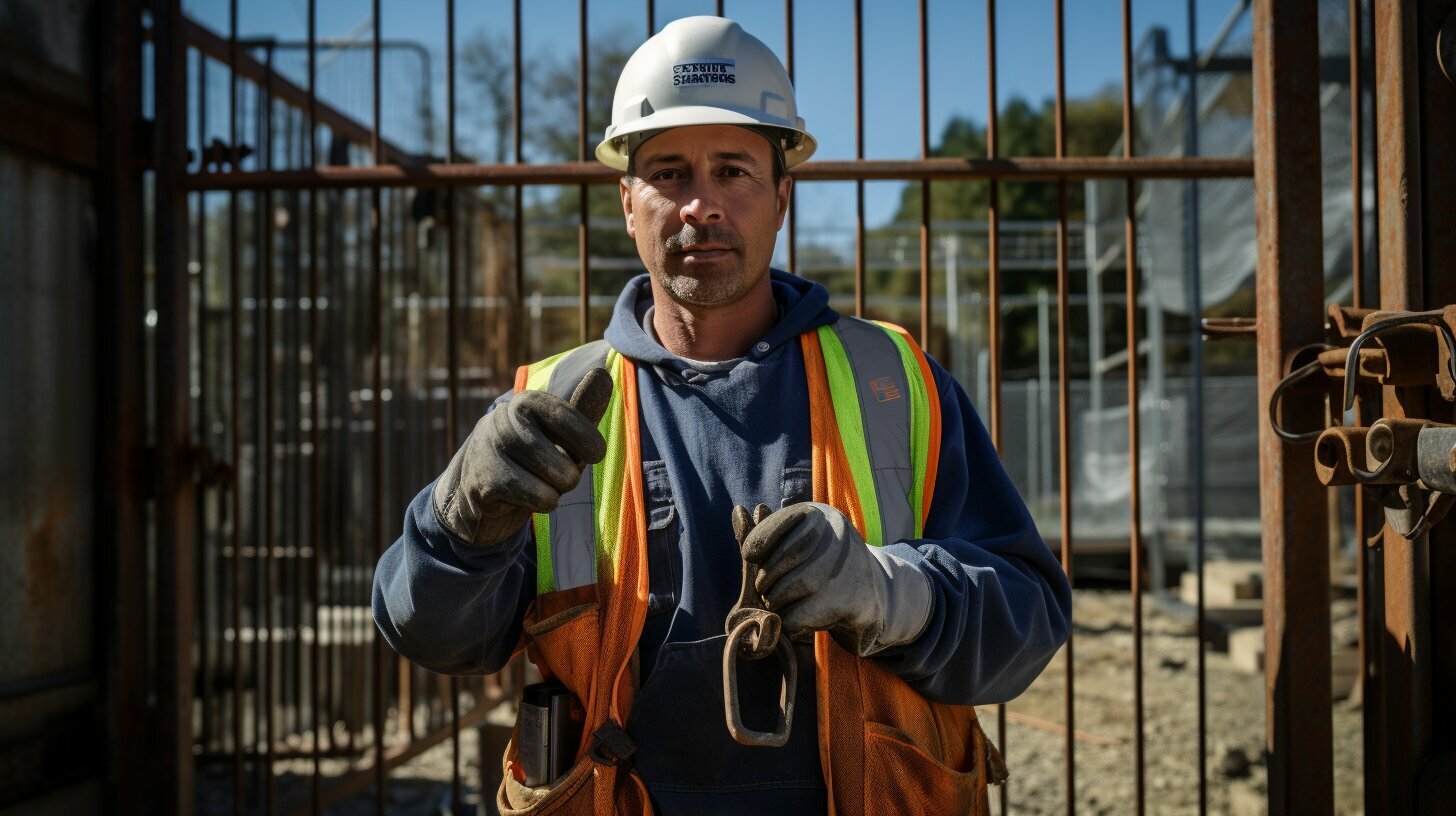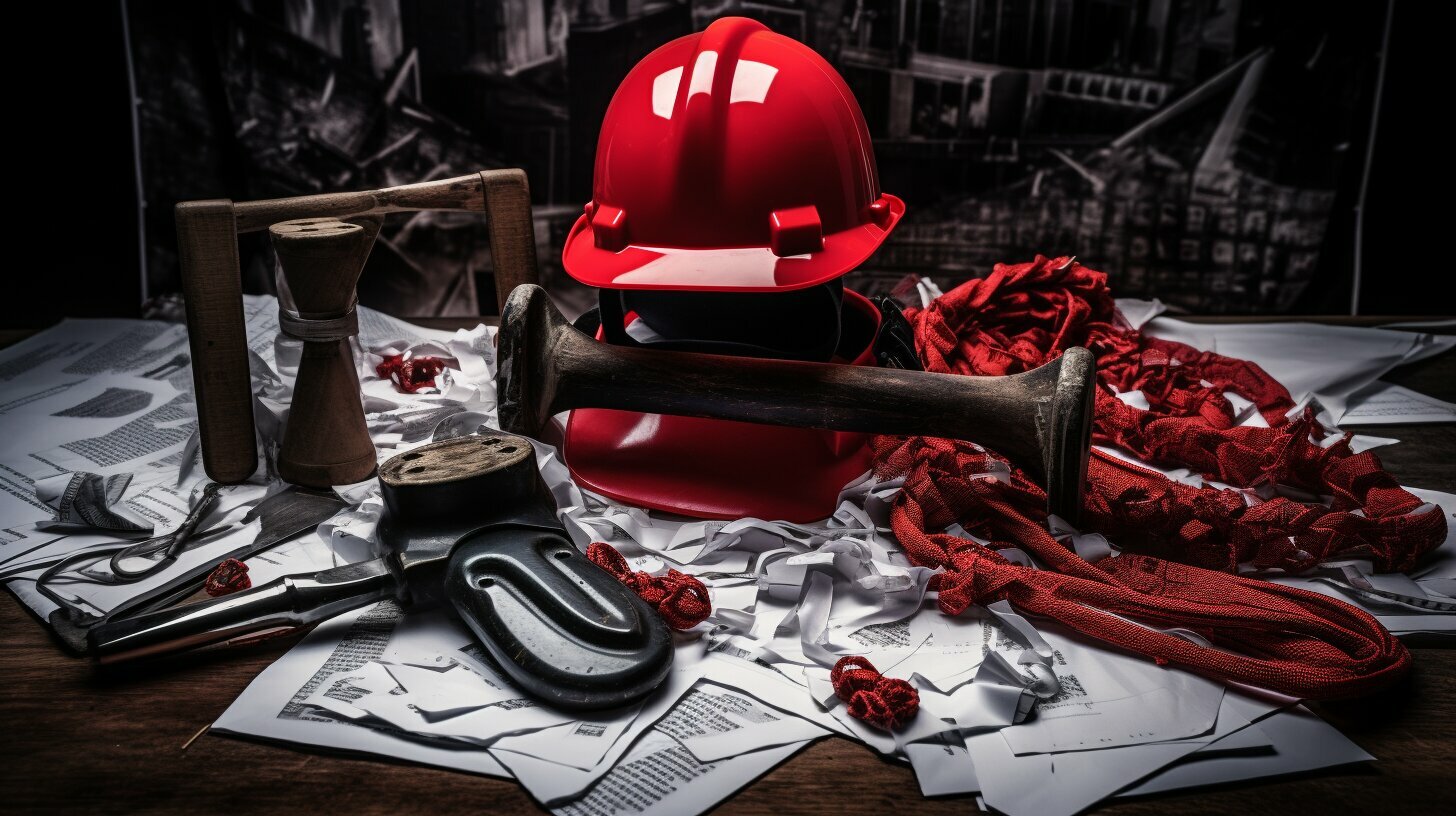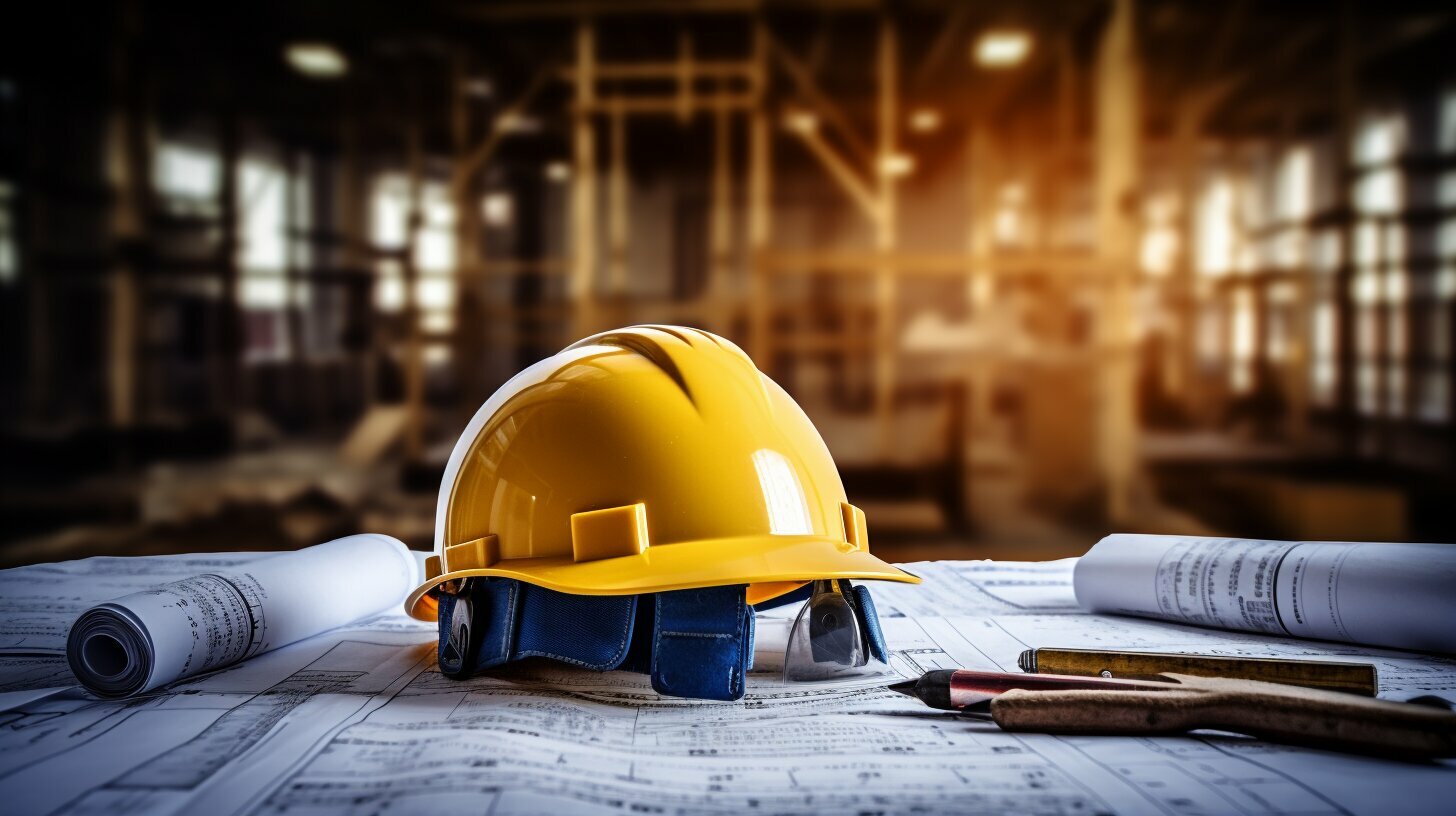
A general contractor plays a crucial role in the planning, execution, and management of construction projects. They are responsible for overseeing the entire construction process, ensuring that everything runs smoothly from start to finish. In this article, we will explore the responsibilities and job description of a general contractor, highlighting their essential role in the success of construction projects.
Key Takeaways:
- A general contractor is responsible for planning, executing, overseeing, and inspecting construction projects.
- They coordinate activities, manage employees, and ensure compliance with local codes and laws.
- General contractors hire subcontractors for specialized tasks and serve as the main point of contact between the client and other parties involved in the project.
- They oversee project planning, project management, and project tracking.
- General contractors address legal and regulatory concerns, ensuring the construction project meets all necessary requirements.
The Duties and Responsibilities of a General Contractor
The duties and responsibilities of a general contractor encompass a wide range of tasks throughout the construction process. They play a crucial role in ensuring the successful execution and completion of construction projects. From project planning and management to legal compliance and budget oversight, a general contractor is responsible for overseeing every aspect of the construction project.
One of the primary responsibilities of a general contractor is project planning and management. They work closely with the client to determine project goals, timelines, and budget constraints. By creating a detailed project plan, the general contractor ensures that all tasks are completed in a timely manner and within the allocated budget. They also coordinate with subcontractors, consultants, and vendors to ensure smooth operations and adherence to project milestones.
A general contractor is also responsible for addressing legal and regulatory concerns. They ensure that the construction project complies with all local codes and regulations. This includes obtaining necessary permits, licenses, and inspections to ensure the project meets all legal requirements. By staying up-to-date with the latest building codes and regulations, the general contractor ensures a safe and compliant construction site.
In addition to legal compliance, a general contractor plays a vital role in ensuring health and safety on the construction site. They develop and implement safety protocols to minimize risks and accidents. By conducting regular safety inspections and providing appropriate training, the general contractor creates a safe working environment for all workers on the construction site.
| Responsibilities | Duties |
|---|---|
| Project planning and management | Creating project plans, setting timelines, managing budget |
| Legal and regulatory compliance | Obtaining permits, ensuring compliance with building codes |
| Health and safety management | Developing safety protocols, conducting inspections, providing training |
“The duties and responsibilities of a general contractor encompass a wide range of tasks throughout the construction process.”
Conclusion
In conclusion, a general contractor is a key figure in any construction project. Their duties and responsibilities include project planning, managing subcontractors and vendors, ensuring legal compliance, and maintaining health and safety on the construction site. By overseeing all aspects of the construction process, a general contractor ensures the successful completion of the project within budget and on time.
Project Planning and Management
Project planning and management are critical aspects of a general contractor’s role in successfully completing construction projects. They involve careful coordination of various tasks, resources, and timelines to ensure the project progresses smoothly and is completed within the set timeframe and budget.
At the core of project planning is the creation of a comprehensive project plan that outlines all the necessary steps and milestones required for successful project completion. This includes identifying the scope of work, setting realistic timelines, allocating resources effectively, and establishing clear communication channels among all stakeholders involved.
Once the project plan is in place, the general contractor takes on the role of project manager, overseeing the execution of the plan and monitoring progress at every stage. This includes coordinating with subcontractors, suppliers, and consultants, ensuring they deliver their respective tasks on time and to the required quality standards.
Effective project management also involves regular tracking and evaluation of project milestones and performance indicators. This helps identify any potential delays or issues early on, allowing the general contractor to take necessary corrective actions to keep the project on track. Additionally, project management encompasses risk management, identifying potential risks and implementing strategies to mitigate them.
Project Planning and Management Table:
| Key Elements | Description |
|---|---|
| Project plan | A comprehensive document outlining the scope, timelines, and resources required for successful project completion. |
| Coordination | Effective management of subcontractors, suppliers, and consultants to ensure timely delivery of tasks and materials. |
| Progress tracking | Ongoing monitoring of project milestones and performance indicators to identify and address any delays or issues. |
| Risk management | Identification of potential risks and implementation of strategies to minimize their impact on the project. |
Legal and Regulatory Compliance
A general contractor is responsible for navigating the complex legal and regulatory landscape of construction projects. With numerous laws and regulations governing the construction industry, it is crucial for contractors to have a comprehensive understanding of their obligations and ensure compliance at every stage of the project.
To address legal and regulatory concerns, general contractors must remain up-to-date with local building codes, zoning ordinances, and safety regulations. They play a crucial role in obtaining the necessary permits and licenses, ensuring that the construction project meets all necessary requirements.
Furthermore, general contractors are responsible for managing subcontractors, consultants, and vendors who also have legal and regulatory obligations. They must ensure that all parties involved adhere to relevant laws, such as labor and employment regulations, environmental regulations, and occupational health and safety standards.
Key Responsibilities:
- Obtaining permits and licenses
- Ensuring compliance with building codes and regulations
- Managing subcontractors, consultants, and vendors’ legal obligations
- Adhering to labor and employment regulations
- Ensuring compliance with environmental regulations
- Maintaining occupational health and safety standards
By addressing legal and regulatory concerns, general contractors minimize the risk of legal disputes, project delays, and financial penalties. They play a vital role in maintaining a safe and compliant construction site, protecting the interests of the client, subcontractors, and the general public.
Table: Legal and Regulatory Compliance Checklist
| Responsibility | Action |
|---|---|
| Obtaining permits and licenses | Research and acquire the necessary permits and licenses to comply with local regulations. |
| Building codes and regulations | Ensure compliance with local building codes and regulations throughout the project. |
| Managing subcontractors, consultants, and vendors’ legal obligations | Educate subcontractors, consultants, and vendors about relevant laws and ensure they meet their legal obligations. |
| Labor and employment regulations | Adhere to labor and employment regulations, including fair employment practices and worker safety. |
| Environmental regulations | Comply with environmental regulations, including waste management and pollution prevention measures. |
| Occupational health and safety standards | Maintain a safe workplace by implementing and enforcing proper health and safety protocols. |
Health and Safety on the Construction Site
The general contractor plays a vital role in maintaining a safe working environment on the construction site. They are responsible for implementing and enforcing health and safety protocols to ensure the well-being of all workers and visitors. By prioritizing safety measures, the general contractor reduces the risk of accidents, injuries, and potential litigation.
One of the primary duties of a general contractor is to conduct regular safety inspections to identify hazards and address them promptly. This includes assessing the site for potential risks such as uneven terrain, inadequate lighting, and the presence of hazardous materials. They also ensure the proper use of personal protective equipment (PPE) by providing it to the workers and enforcing its usage.
The general contractor collaborates with various subcontractors and ensures they adhere to safety guidelines. This involves conducting safety meetings, providing training, and promoting a culture of safety throughout the construction project. By effectively managing health and safety concerns, the general contractor creates a safe and conducive environment for workers to carry out their tasks efficiently.
Key Responsibilities of a General Contractor in Ensuring Health and Safety:
- Conducting regular safety inspections to identify and mitigate potential hazards.
- Providing and enforcing the use of personal protective equipment (PPE).
- Collaborating with subcontractors to ensure adherence to safety guidelines.
- Promoting and conducting safety meetings and training sessions.
- Creating a culture of safety and accountability on the construction site.
Overall, the general contractor assumes a critical role in safeguarding the well-being of everyone involved in the construction project. Their attention to health and safety not only ensures compliance with regulations but also contributes to the successful completion of the project on time and within budget.
| Responsibilities | Duties |
|---|---|
| Conduct safety inspections | Identify potential hazards and address them promptly |
| Provide personal protective equipment (PPE) | Ensure proper usage and enforce safety practices |
| Coordinate with subcontractors | Ensure adherence to safety guidelines and protocols |
| Facilitate safety meetings and training | Promote a culture of safety and accountability |
Coordination of Subcontractors, Consultants, and Vendors
Effective coordination of subcontractors, consultants, and vendors is a crucial responsibility of a general contractor. They play a pivotal role in managing the various parties involved in a construction project, ensuring smooth collaboration and successful project completion. With their expertise in project management and organizational skills, general contractors facilitate efficient communication, streamline operations, and maintain project timelines.
One of the key aspects of coordinating subcontractors, consultants, and vendors is establishing clear lines of communication. General contractors act as the main point of contact between the client and the different parties involved. They facilitate effective communication channels, ensuring that everyone is on the same page regarding project requirements, deadlines, and any changes that may arise.
General contractors are responsible for providing necessary equipment and materials, managing contracts, and overseeing the procurement process. They ensure that subcontractors and vendors deliver their services and products in a timely manner, meeting quality standards and project specifications.
In addition to communication, general contractors also handle the procurement process. They are responsible for sourcing subcontractors, consultants, and vendors based on project needs and requirements. General contractors carefully evaluate their capabilities, track records, and credentials to ensure the best fit for the project. This includes negotiating contracts and managing budget allocations for each party involved.
By effectively coordinating subcontractors, consultants, and vendors, general contractors streamline project execution, minimize delays, and maximize productivity. Their ability to manage multiple stakeholders, align project goals, and maintain accountability is essential for the successful completion of any construction project.
Table 1: Examples of Coordinated Tasks
| Party | Responsibilities |
|---|---|
| Subcontractors | Perform specialized tasks, such as plumbing, electrical work, or carpentry, as per project requirements. |
| Consultants | Provide expert advice in areas such as architecture, structural engineering, or interior design to ensure compliance and project success. |
| Vendors | Supply necessary materials, equipment, and supplies required for the construction project, adhering to quality and quantity specifications. |
Quality, Timeline, and Budget Oversight
A general contractor is responsible for maintaining quality standards, adhering to project timelines, and managing the project’s budget. They play a crucial role in ensuring that the construction project meets the highest standards of quality and craftsmanship. This involves overseeing the work of subcontractors, consultants, and vendors to ensure that all tasks are completed to the client’s satisfaction.
To effectively manage project timelines, general contractors employ strategic planning and efficient coordination. They create detailed schedules, set milestones, and closely monitor progress to ensure that the project stays on track. By effectively managing timelines, general contractors help to minimize delays and avoid costly setbacks in construction projects.
One of the most important tasks of a general contractor is managing the project’s budget. They work closely with the client to establish a realistic budget and carefully track expenses throughout the construction process. This involves negotiating prices with subcontractors, suppliers, and vendors to obtain the best possible deals. By closely monitoring the budget, general contractors help to ensure that the project remains financially viable, without compromising on quality.
Overall, the general contractor’s tasks encompass overseeing quality control, maintaining project timelines, and managing the project’s budget. Their expertise and experience are vital in ensuring a successful construction project that meets the client’s expectations. With their attention to detail and dedication to excellence, general contractors play a key role in the successful completion of construction projects.
| Responsibilities | Tasks |
|---|---|
| Quality Control | Ensuring that all work meets quality standards and specifications |
| Timeline Management | Creating project schedules, setting milestones, and monitoring progress |
| Budget Management | Estimating project costs, tracking expenses, and negotiating contracts |
Conclusion
Understanding the role of a general contractor is crucial for the successful completion of construction projects. A general contractor is responsible for planning, executing, overseeing, and inspecting the entire construction process, ensuring that every aspect of the project is managed efficiently and effectively.
From coordinating activities and managing employees to complying with local codes and laws, the general contractor plays a pivotal role in keeping the project on track. They are the main point of contact between the client and other parties involved, ensuring clear communication and seamless collaboration throughout the construction project.
With their expertise in project planning and management, general contractors ensure that everything is in order, from project initiation to completion. They oversee the project timeline, budget, and quality, making sure that the construction project stays within the set parameters. Additionally, they address legal and regulatory concerns, ensuring that the project meets all necessary requirements.
Moreover, general contractors prioritize the health and safety of everyone on the construction site. They implement safety protocols, manage potential risks, and ensure a safe working environment for all workers involved. They also coordinate subcontractors, consultants, and vendors, hiring specialized professionals for specific tasks, thereby streamlining the construction process.
In conclusion, a general contractor is a crucial figure in construction projects. Their role encompasses project planning, management, compliance, safety, and coordination of various parties involved. By understanding their responsibilities and capabilities, clients can effectively work with general contractors to ensure the successful completion of their construction projects.
FAQ
What is the role of a general contractor?
A general contractor is responsible for planning, executing, overseeing, and inspecting a construction project from start to finish. They coordinate activities, manage employees, ensure compliance with local codes and laws, and hire subcontractors for specialized tasks.
What are the specific responsibilities of a general contractor?
Specific responsibilities include project planning, project management, project tracking, addressing legal and regulatory concerns, ensuring health and safety on the construction site, and serving as the main point of contact between the client and other parties involved in the project.
What is the role of a general contractor in project planning and management?
A general contractor oversees the entire project from start to finish, ensuring everything is on track and within budget. They are responsible for coordinating activities, managing timelines, and ensuring efficient project execution.
How does a general contractor address legal and regulatory concerns?
A general contractor ensures the construction project meets all necessary requirements and regulations. They obtain necessary permits, coordinate inspections, and ensure compliance with building codes and local laws.
What is the role of a general contractor in ensuring health and safety on the construction site?
The general contractor implements safety protocols, manages potential risks, and ensures a safe working environment for all workers on the construction site. They adhere to occupational health and safety standards to prevent accidents and injuries.
How does a general contractor coordinate subcontractors, consultants, and vendors?
A general contractor is responsible for sourcing and managing subcontractors, consultants, and vendors for specialized tasks. They coordinate the activities of these parties to ensure smooth project execution and timely completion.
What is the general contractor’s role in overseeing quality, timeline, and budget?
A general contractor ensures the project meets quality standards, stays on schedule, and remains within budgetary constraints. They monitor progress, address any issues that arise, and make necessary adjustments to ensure project success.
What are the key points to understand about the role of a general contractor?
The role of a general contractor is essential in construction projects. They are responsible for planning, executing, and overseeing the entire construction process, ensuring compliance with regulations, managing subcontractors, and maintaining quality, timeline, and budget oversight.
continue reading
Related Posts
Obtaining a general contractor license is a crucial step towards
Acquiring a general contractor license involves a multi-step journey that
A general contractor plays a crucial role in construction projects,




